Share
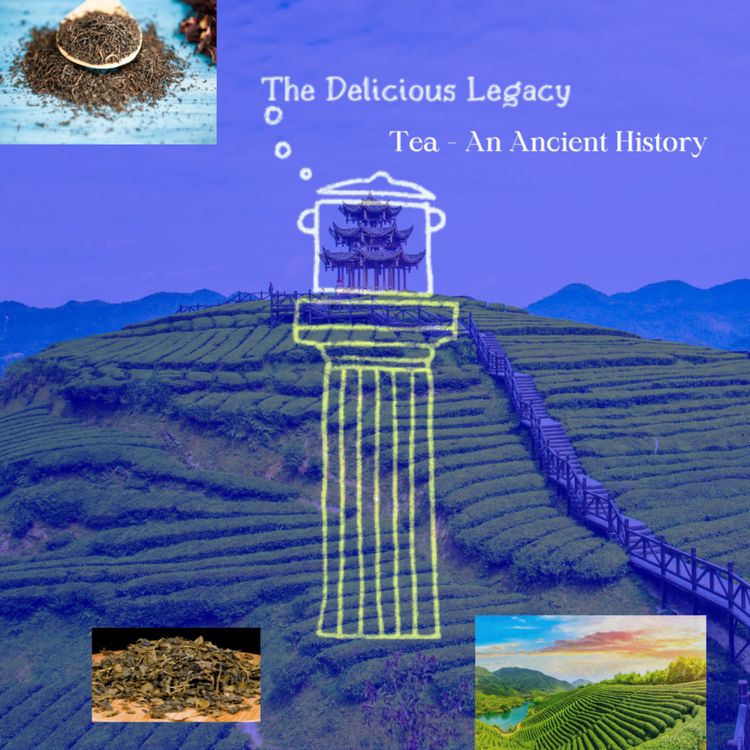
The Delicious Legacy
Tea - An Ancient History
"The monks say the divine flavour befits quiet seclusion.
The abundant fluttering leaves become a welcome guest.
They would send a package to my prefectural office,
But the brick well and copper stove would ruin its
character.
Worse yet, the spring teas from Meng Mountain and
Guzhu
Sealed in white clay, stamped in red, they travel dusty
roads.
If you want to know the pure cooling taste of milky buds,
You must be one who sleeps in clouds and squats on rocks."
These are the words of the early ninth-century poet Liu Yuxi. After drinking tea with Buddhist monks on a mountain, Liu contemplates the tragedy of taking a parcel of tea home with him...
Hello! Welcome back to another episode of The Delicious Legacy, my hungry and curious archaeogastronomers!
I'm Thom Ntinas and this is a short history of Tea. The world's most thirst-quenching liquid after water!
Enjoy!
Support the podcast on Ko-Fi and Patreon for ad-free episodes!
More episodes
View all episodes
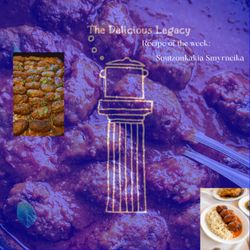
Soutzoukakia Smyrneika (Spicy meat balls from Smyrna)
13:16|Hello!Your recipe of the week on a Saturday is out! And what better dish than a Greek Sunday favourite?Izmir, Smyrni or Smyrna:One city, three names, a shared history of three thousand years! Being “born” in such a place, in the crossroads of trade, our recipe for “Soutzoukakia Smyrneika” or Izmir kofte encompasses spices valuable for trade and meat and ideas from East and West. And thus making a syncretic dish, delicious, luxurious and celebratory.Enjoy!Thom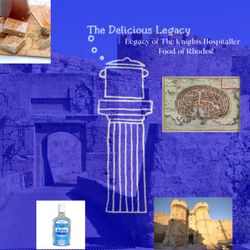
23. Legacy of The Knights Hospitaller - Food of Rhodes!
26:31||Season 7, Ep. 23Hello!Rhodes is a rich history island with a lush landscape and an illustrious past.After the fall of Acre in 1291 CE, the Knights Hospitaller last stronghold in the East Med for the next two centuries was the island of Rhodes.Rhodes is the biggest island of the Dodecanese complex, and place of trade in the eastern Mediterranean for more than three thousand years!What is 'Souma', and 'Melekounia'? And how do the Rhodians use cyclamen in their cooking?Let's find out about here food here!Enjoy!ThomThe Delicious Legacy Podcast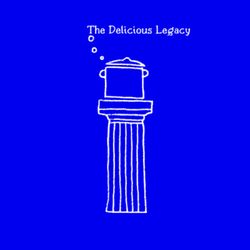
Pork, Chestnut & Chickpea Stew from the Island of Lesvos
08:09|Hello!Happy weekend.Here's our recipe of the week;A Christmas pork stew from the island of Lesvos! I cannot quite shake away the Christmas feeling...! Enjoy!The Delicious Legacy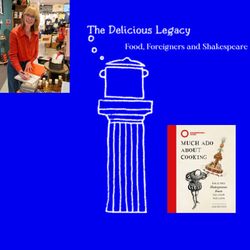
22. Food, Foreigners and Shakespeare
01:23:09||Season 7, Ep. 22Hello! New episode for all my hungry archaeogastronomers!In Act 2, Scene 2 of the Merry Wives of Windsor Frank Ford says:‘I will rather trust a Fleming with my butter, Parson Hugh the Welshman with my cheese, an Irishman with my aqua-vitae bottle, or a thief to walk my ambling gelding, than my wife with herself.’Why do certain nationalities have close associations with certain foods? And what does this tell us about early modern English attitudes to foreigners? Was this something common across all strata of society?One of the ways to explore these attitudes is to look at how foreigners are represented in plays particularly when it comes to food. I spoke to food historian and fellow podcaster Sam Bilton about this. Sam has recently released a cookbook called Much Ado About Cooking which looks at the food references in Shakespeare’s play.On this episode then the above questions and a lot more regarding kitchen technology and implements of the time, measurements and terminology in the 16th Century, best recipes and dishes are answered. So join us onto another adventure through food and history!Enjoy!The Delicious LegacyRecommendations of the week:The UK Will Soon Be Home To The Largest Oyster Reef In Europe – As Four Million Oysters Are Being Dropped Into The North Sea As Part Of A Restoration Project To Help Restore Marine Ecosystems And Clean Water:https://secretldn.com/uk-home-to-largest-oyster-reef-in-europe-norfolk-coast-restoration-project/#google_vignetteThe importance of being malted: making malt and malt sugars from cereals in the Palaeolithic. https://merryn.dineley.com/2025/12/the-importance-of-being-malted-making.html?m=1The Meaning of Borsch:https://open.spotify.com/episode/1ne63nGnDvTYgT2OFiayzf?si=c0b1449fe848458bLoveThom & The Delicious Legacy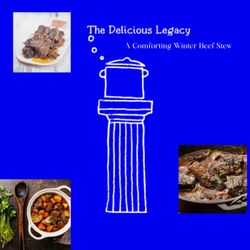
Stocking Filler! Recipe of the week a Comforting Winter Beef Stew
08:37|Hello!Your recipe of the week is out!Recommendations of the week:Sarcophagus found at Church of St. Nicholas could be the tomb of “Santa Claus”:https://www.heritagedaily.com/2024/12/sarcophagus-found-at-church-of-st-nicholas-could-be-the-tomb-of-santa-claus/154084Roman occupation of Britain damaged the population’s health:https://www.newscientist.com/article/2508181-roman-occupation-of-britain-damaged-the-populations-health/On contrarian history:https://going-medieval.com/2025/11/25/on-contrarian-history/Enjoy!Much Love and Happy New Year to all!The Delicious Legacy Podcast
Recipe of The Week Three: Kalymnos Octopus Fritters
06:01|Hello!Happy Christmas!Here's your recipe of the week this time from the beautiful Dodecanese island of Kalymnos!Enjoy!With music from Miltos BoumisLoveThom & The Delicious Legacy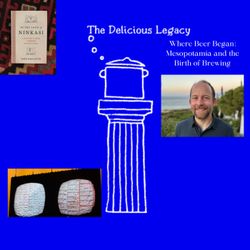
21. Where Beer Began: Is the Mesopotamian Origin Story Correct & The Birth of Brewing
49:49||Season 7, Ep. 21Hello my curious archeaogastronomers!Who were the first beer makers? Why did they even made beer in the first place? Can we even find a Civilization to be the clear winner in this "race"? What's the word for beer in ancient Sumerian?What role the priests and kings plaid in this? Who even drunk beer in the ancient Mesopotamian world? All this and many more questions were buzzing through my mind.On today's episode I have as a guest the author of the book In The Land of Ninkasi: A History of Beer in Ancient Mesopotamia, Tate Paulette.Tate’s book has recently won two awards:Felicia A. Holton Book Award, Archaeological Institute of AmericaThis award is given annually to a writer or writers who, through a major work of non-fiction, represents the importance and excitement of archaeology to the general public. The work should have broad public appeal and be written for an adult lay audience in a clear and engaging style. It should convey the excitement of archaeological discovery accurately and responsibly. It should be well-researched and provide new insight for the general public. https://www.archaeological.org/2026-aia-awards-spotlight-felicia-a-holton-book-award/And he also won the Nancy Lapp Popular Book Award, American Society of Overseas Research:This award is presented to the author/editor of a book published in the last two years that offers a new synthesis of archaeological or textual evidence from the Ancient Near East and Eastern Mediterranean intended to reach an audience of scholars as well as students and the broader public.https://www.asor.org/about-asor/honors-awards/previous-award-recipients/Alright! Time for my delightful and interesting I hope recommendations for this week are the following:Disco scallops:Here’s a link:https://www.discoscallops.co.uk/A Spirit Never to Betray” before tequila and mescal there was another: David Lauer investigates the fate of a spiky ancient desert plant called sotol, and its alliance with generations of artisans who distil a fiery spirit from its heart.https://dark-mountain.net/a-spirit-never-to-betray/And finally the website https://www.ukrainer.netA community and organisation that has been researching Ukraine and the Ukrainian context since 2016, telling stories to Ukrainian audiences and broadcasting them to the world in dozens of languages.xEnjoy!Photo credits : Book Tate Paulette, Cuneiform Tablets Justin Kase Conder, Portrait Kathryn GrossmanThom & The Delicious Legacy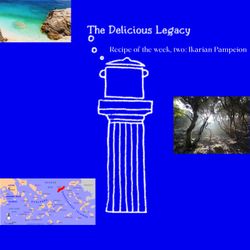
Stocking fillers: Recipe of the week, two: Ikarian Pampeion
06:51|Hello!Every Saturday in The Delicious Legacy podcast your freshest "stocking filler" recipe of the week is out!This time I’m travelling to the delightful island of Ikaria in the Western Aegean sea!With a simple one pot veg recipe!If you want to know more about Ikaria, read my Patreon post here:https://www.patreon.com/posts/ikaria-island-of-115744979Music by Milts BoumisLove,The Delicious Legacy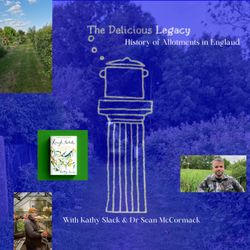
20. A History of Allotments in England
47:08||Season 7, Ep. 20Hello!New episode is out now!Why England and by extension all of UK is so allotment "obsessed" ? What does it all mean?Firstly, what is an allotment? When did it all started?As someone who moved in UK many years ago, seeing this lovely spaces in cities filled me with a sense of serenity, and an air of quaint old school happiness lets say, they evoked something romantic and from long lost era. Of course over the years I learned a lot about why these exist; what purpose and role fulfil in the society and the soul of the nation.Who has one, who are they owned and maintained by, and crucially why people still insist having? What is the source of their popularity?Importantly, can one person/family feed themselves with produce from an allotment? Is there any point on doing so?Anyway I hope you'll enjoy my little potted allotment history here alongside with the interview with author and gardener Kathy Slack and nature conservationist, environmentalist and wildlife presenter Dr Sean McCormack!Kathy's Substack and Insta:https://kathyslack.substack.com/https://www.instagram.com/gluts_gluttony/Sean's media:https://drseanmccormack.com/https://www.instagram.com/thatvetsean/Get his lovely children's book about rewildinghttps://www.thegreatbritishbookshop.co.uk/products/beaver-believerspos=1&sid=f9e160ecd&_ss=rLinks about allotments and London's city farms and gardens:Calthorpe Community Garden:https://www.calthorpecommunitygarden.org.uk/about-usSitopia Farmhttps://sitopiafarm.com/pages/about-our-farmCommunity veg boxes:https://growingcommunities.org/Love,The Delicious Legacy